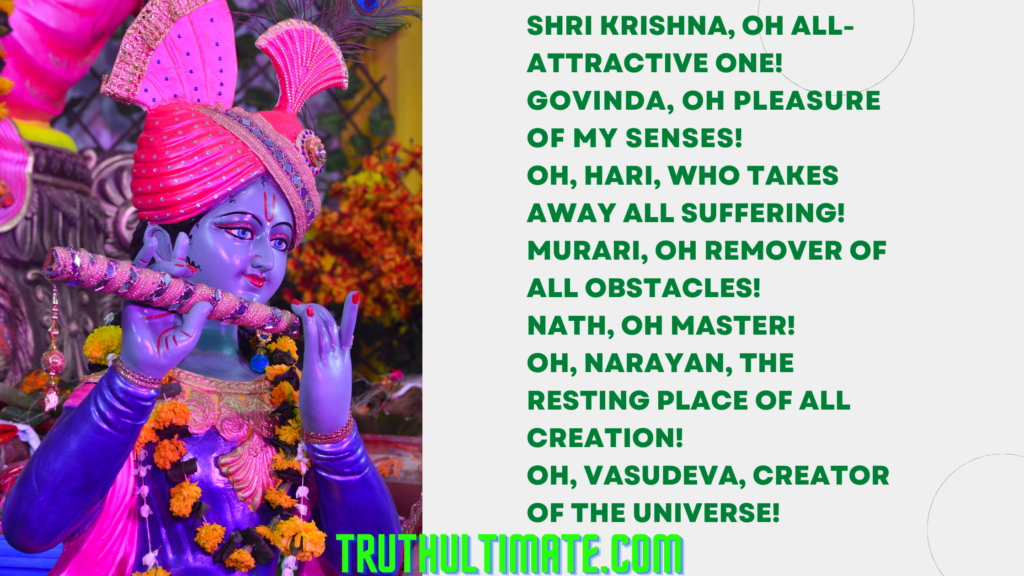Shri Krishna Govind Hare Murari is one of the most popular bhajans of the Bhakti tradition chanted by devotees to be blessed by the Supreme Self.

There are three prominent paths to reach the Supreme Consciousness or the Ultimate Truth. The Jnana Yoga (Knowledge), The Bhakti Yoga (Devotion), and the Karma Yoga (Action)- these three paths lead to knowing the supreme reality.
The Jnana yoga needs an intense and challenging study to acquire such knowledge to reach the highest self.
Karma Yoga emphasizes doing your duty without craving and attachment of results. This path is rare, and few dare and work hard to walk.

The path of Bhakti is the easiest of all three; however, it needs the highest devotion and complete surrender to the Supreme Consciousness.
Shri Krishna Govind Hare Murari is one such great Bhakti chanting to please the Supreme Lord.
Shri Krishna Govind hare Murari

Shri Krishna Govinda hare Murari
hey Nath Narayana Vasudeva
Meaning:
Shri Krishna, Oh all-attractive one!
Govinda, Oh pleasure of my senses!
Oh, Hari, who takes away all suffering!
Murari, Oh remover of all obstacles!
Nath, Oh Master!

Oh, Narayan, the resting place of all creation!
Oh, Vasudeva, creator of the universe!
Shri Krishna Govind hare Murari meaning
Here are the literal meanings of the mantra, Shri Krishna Govinda Hare Murari, Hey Nath Narayana Vasudeva, which in Devanagri script can be written as,
श्री कृष्ण गोविन्द हरे मुरारे | हे नाथ नारायण वासुदेव
- Srī means auspicious in the literal sense and is used as an honorific title before names.
- It can also refer to Lakshmi, Vishnu’s consort since her beej mantra is Shrim.
- Kṛṣhṇa simply means an avatar, or incarnation, of Vishnu, the preserver of the universe.
- As we all know that He is the supreme being, the Atman, the inner soul.
- Moreover, Shri Krishna is known for His radiant beauty, playful qualities, and transcendent flute playing.
- Govinda is a name for the youthful Krishna and can also be taken in the meaning of the lord of the cows.
- Hare can be variously interpreted. Sometimes, it can mean the vocative form of Hari, which is the name of Vishnu, of whom Krishna is an avatar or incarnation. Furthermore, you can also interpret the name of Radha.
- Murāre or Murari is a name for Krishna as the killer of the demon Mura.
- He is pronounced as “Hey,” which is exactly similar to the one in English and is also used for addressing someone.
- Nātha is just another Sanskrit’s word to say “Lord.”
- Nārāyaṇa is the name of Vishnu, the supreme God who is the preserver of the universe.
- It is also be taken in the meaning of ‘resting place for all living beings.
- Vāsudeva is another name for Krishna, whose father was Vasudeva.
- So, if you elongate the first “a” in Sanskrit, it turns into “the son of,” which means “son of Vasudeva.”
Shri Krishna Govind hare Murari lyrics
Shri Krishna Govind hare Murari lyrics sung by the great Jagjit Singh is considered the most melodious one.
The soothing voice of the gazal king Jagjit Singh makes this devotional song close to the soul.
This bhajan is one of the most popular ones played in the households while praying to Lord Krishna.
It is considered the best devotional song along with “tu hi hai maata, tu hi pita hai” sung by Jagjit Singh.
Shri Krishna Govind Hare Murari
He Nath Narayan Vasudeva॥ He Nath Narayan…॥
Ek Maat Svami Sakha Hamare
He Nath Narayan Vasudeva॥ He Nath Narayan…॥,
Shri Krsna Govind Hare Murari…॥
Bandi Grah Ke Tum Avatari
Kahi Janme Kahi Pale Murari
Kisi Ke Jaye Kisi Ke Kahaye
Hai Adbhud Har Baat Tihari॥ Hai Adbhud…॥
Gokul Mein Chamake Mathura Ke Tare
He Nath Narayan Vasudeva॥,
Shri Krishna Govind Hare Murari…॥
Adhar Pe Banshi Hraday Mein Radhe
Bat Gaye Donon Mein Aadhe Aadhe
He Radha Naagar He Bhakt Vatsalya
Sadaiv Bhakton Ke Kaam Sadhe॥ Sadaiv Bhakton…॥
Vahi Gaye Vahi Gaye Vahi Gaye
Jaha Gaye Pukare
He Nath Narayan Vasudeva॥,
Shri Krishna Govind Hare Murari…॥
Geeta Mein Upadesh Sunaya
Dharm Yuddh Ko Dharm Bataya
Karm Tu Kar Mat Rakh Phal Ki Ichchha
Yah Sandesh Tumhi Se Paya
Amar Hai Geeta Ke Bol Sare
He Nath Narayan Vasudeva॥,
Shri Krsna Govind Hare Murari…॥
Tvamev Mata Cha Pita Tvamev
Tvamev Bandhu Sakha Tvamev
Tvamev Vidya Dravinan Tvamev
Tvamev Sarvan Mam Dev Deva
Shri Krishna Govind hare Murari hey Nath Narayan Vasudeva
We have seen many versions of this specific mantra or sloka, and the recent one is “Jubin Nautiyal’s” version and the lyrics are as follows.
कृष्णा, हरे कृष्णा, कृष्णा-कृष्णा
देवकी नंदन, तुमको वंदन, रखते सबकी लाज
सबके स्वामी, अंतर्यामी, पूरन कीजे काज
देवकी नंदन, तुमको वंदन, रखते सबकी लाज
सबके स्वामी, अंतर्यामी, पूरन कीजे काज
मन मंदिर में सजे बिहारी
मनमोहन, तेरी छवि अति प्यारी
मन मंदिर में सजे बिहारी
मनमोहन, तेरी छवि अति प्यारी
बंसी बजैया, रास रचैया
तारणहार मेरे, तुम ही खिवैया
तुमसे बड़ा कहाँ कौन, कन्हैया
श्री कृष्ण गोविंद हरे मुरारे
हे नाथ नारायण वासुदेवा
श्री कृष्ण गोविंद हरे मुरारे
हे नाथ नारायण वासुदेवा
देवकी नंदन, तुमको वंदन, रखते सबकी लाज
सबके स्वामी, अंतर्यामी, पूरन कीजे काज
लीला अपरंपार तेरी, तू “माखनचोर” कहावे
भवसागर से सबकी नय्या तू ही पार लगावे
भक्तों का सहारा, तू बाँसुरी वाला
मथुरा के बसैया, ओ, नंद के लाला
तेरी भक्ति में नाचें सब ता-ता-थैया
श्री कृष्ण गोविंद…
श्री कृष्ण गोविंद हरे मुरारे
हे नाथ नारायण वासुदेवा
हे नाथ नारायण वासुदेवा
देवकी नंदन, तुमको वंदन, रखते सबकी लाज
सबके स्वामी, अंतर्यामी, पूरन कीजे काज
देवकी नंदन, तुमको वंदन, रखते सबकी लाज
सबके स्वामी, अंतर्यामी, पूरन कीजे काज
Anup Jalota Shri Krishna Govind hare Murari
Here are the lyrics of “Anup Jalota’s version of Shri Krishna Govind Hare Murari.
श्री कृष्ण गोविन्द हरे मुरारी
हे नाथ नारायण वासुदेवा
श्री कृष्ण गोविन्द हरे मुरारी
हे नाथ नारायण वासुदेवा
पितु मात स्वामी सखा हमारे
पितु मात स्वामी सखा हमारे
हे नाथ नारायण वासुदेवा
श्री कृष्ण गोविन्द हरे मुरारी
हे नाथ नारायण वासुदेवा
श्री कृष्ण गोविन्द हरे मुरारी (आ आ आ)
हे नाथ नारायण वासुदेवा (आ आ आ)
हलपति कंस ने पूत पठाये
विविध रूप धर धर के आये
आ आ आ
बुद्धि हिन ने ये भी न जाना
कौन प्रभु का वध कर पाए
Shri Krishna Govind hare Murari essay
Mantras are one of the most misconstrued parts of Yoga.
Sadhguru clarifies how a mantra isn’t only a sound you utter but something you endeavor to become.
The entire presence and existence is a blend of different mantras. Of these, a couple of mantras or sounds have been distinguished, which could resemble keys.
Using them with a specific goal in mind becomes a key to opening up an alternate element of life and experience inside you.
Mantras have an impact on the brain and body. Mantras are soft sounds; numerous neuroscientists have demonstrated that the sound and language of mantras impact the parts of our life.
Reciting mantras later, Yoga or contemplation can give you a decent outcome.
If you chant this mantra with complete devotion, you simply are asking to send the blessings your way.

You ask his grace so that he can bless your life with his sweet demeanor. So, whenever you are in any problem, this mantra is a way to call for help from your Lord Krishna.
Chanting this mantra is similar to a child asking for help from his mother.
You take the auspicious names of Lord Krishna and cry for help so that he can bless your life and solve your problems.
It’s one of the simplest and easiest ways to call God, he is just waiting for a devoted call.
He already knows that you are in trouble, and once you call him with devotion, he definitely will bring solutions to your problems.
But, have we ever thought that we seek help from God only when we are in trouble? Isn’t it selfish? Yes, it is.
We behave selfishly rather than selfless. God is here always, God is ours, it’s just we have forgotten our relationship with him.
So, when we chant the pious names of God, it reminds us of his importance and who we are in front of him.
It makes us realize our true self and status, which belongs to God only! Only to him. We have to go back to him, and even in this world, we always need His help.
There is nothing that we can do without his help. So, without wasting much time, make this a part of your routine and start taking God’s name every day.
You can liberate yourself from the materialistic world and its all sorts of suffering by surrendering and devotion to the Supreme Consciousness.
courtesy: youtube.com
courtesy: Google.com





